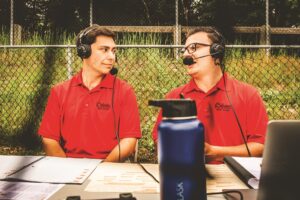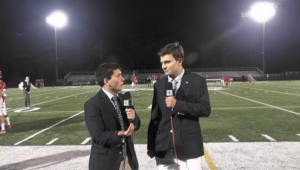ORLEANS — Every year elite undergraduates from across the country come spend a summer with the Orleans Firebirds of the Cape Cod Baseball League. But not all of them are here to play ball.

In addition to its on-the-field roster, the organization selects two student broadcasters to serve as the summer’s voices of the Firebirds, providing play-by-play commentary for each of the team’s 44 regular season games. It’s a competitive gig: the team got some 70 applications for the two posts this year, many from students at the nation’s best broadcasting schools.
This year’s picks are Ian Nicholas, a rising junior at Syracuse, and Dylan Pescatore, a rising senior at Arizona State. Coincidentally, the two got their broadcasting start together at New Canaan High School in Connecticut, when Nicholas was a freshman and Pescatore a sophomore. They’ve been best friends ever since.
Firebirds President Bob O’Donnell said that he hadn’t known the two were old high school pals until the very end of the hiring process but said he hit a “home run” by hiring them.
Nicholas said that before games Pescatore mingles, talking with players to find new storylines, while Nicholas focuses more on the stats: “It works for us.”
The Cape League is seen as a premier destination for aspiring broadcasters, with the other nine teams running similar internship programs. But the success of the Firebirds’ announcers stands out.
Former Firebirds’ broadcasters have gone on to gain national recognition. Four of the last nine recipients of collegiate broadcasting’s highest honor, the Jim Nantz Award, given each year to the top student broadcaster in the country, have been former Firebirds broadcasters.
Carlo Jiménez, the Firebirds’ broadcaster in 2021, became the most recent honoree, winning the award in May shortly after graduating from the University of Southern California.
Arizona State’s Scotty Gange called Firebirds games in 2019 before winning the award in 2020; University of Missouri’s Nate Gatter announced at Eldredge Park in 2015, two years before his win; and 2014 winner Kevin Fitzgerald from Syracuse served as a voice of the Firebirds for both the 2012 and 2013 seasons.
O’Donnell admitted there’s an element of luck to the recent run of winners. But he said it’s also a result of the way candidates are selected. The process involves reviewing résumés and game tape and interviewing candidates.
“We look for a kid who’s very relaxed,” O’Donnell said. For him, “ ‘relaxed’ means someone who is comfortable with their knowledge, with their skillset, and they want to go out and use it.”

But past Firebirds broadcasters said the hiring process alone doesn’t explain the success of the program. Gatter said his experience with the Orleans team was formative.
“I’ve been broadcasting games for a little over nine years,” said Gatter. “I don’t think I have ever improved more in two months than I did on Cape Cod in 2015.” He now broadcasts a variety of sports for ESPN’s SEC Network covering the Southeastern Conference of the NCAA.
Gatter said internship coordinator Elaine Brickman and then-head of media and marketing Stu Murray were important influences. Murray provided feedback and ideas, he said, while giving Gatter the freedom to develop his own technique.
“They provide infrastructure without dictating style,” Gatter said.
Murray is no longer with the team, but the hands-off approach has remained. “This is where they are supposed to experiment and try out things and stand on their own two feet,” O’Donnell said.
This year, the commentators are receiving a little more technical support, thanks to a partnership with production company Pack Network, which provides the broadcasting equipment and offers advice about decisions such as where to place cameras.
But even before that, the Firebirds’ production crew was well staffed and provided valuable assistance to the announcers, said Jiménez. “That made it easy for me to just worry about broadcasting,” he said.
That doesn’t mean the job isn’t demanding. Jiménez said an average day as a commentator on the Cape meant preparing for the night’s game in the morning, getting to the game three hours early to speak to the players and find storylines, broadcasting the game, and then staying up late to begin researching and preparing for the next day’s game. “It’s a grind. You get lost in it,” he said, adding that it “helped me be a better broadcaster.”
Nicholas and Pescatore, who are now one week into the job, said they came in aware of the Firebirds’ broadcasting tradition.
“We’re just trying to continue the legacy,” Pescatore said. “We know who came before us.”
“It’s an honor to be mentioned with names like those,” Nicholas said. “The fact that we work for an organization that picked four individuals who are super dedicated to their craft and naturally very talented means a ton.”
“It definitely still puts a little pressure on us for the next year or so when we still have eligibility for the award,” Pescatore said. “But it gives us that confidence that people who were in our position have done it and we can do the same thing.”
At a Friday evening home game against the Cotuit Kettleers, Nicholas and Pescatore stood at their broadcasting station behind home plate wearing headsets, red Firebirds-branded polos, and khakis and neglecting the chairs behind them so they could see over the short brick wall between them and the field.
“Does it get any better than a Friday night from Eldredge?” Nicholas boomed. “Dylan Pescatore and I don’t think it does!”
Over the course of the game, the pair showed their range. There was excitement, like in the top of the fifth inning, when second baseman Jo Oyama threw out a Cotuit runner at home, prompting Nicholas to declare, “And Oyama says, ‘You’re not going home!’ ” There was insider information, like when Pescatore explained early in the game that Oyama, who is from Japan, is planning to bring his parents to the Cape this summer to see him play for the first time in three years. And there was humor, as when after the elementary school students’ rendition of “Take Me Out to the Ballgame,” Nicholas said, “I don’t think any Grammy-nominated performances were in there.”
As for being relaxed, Pescatore and Nicholas appeared to have that down. Between innings they sang, joked about players’ names, and ribbed each other about mistakes. Then when the next frame was set to begin, Nicholas counted down: “5 … 4 … 3 … 2 ….” A pause. “Back for Firebirds baseball.”
